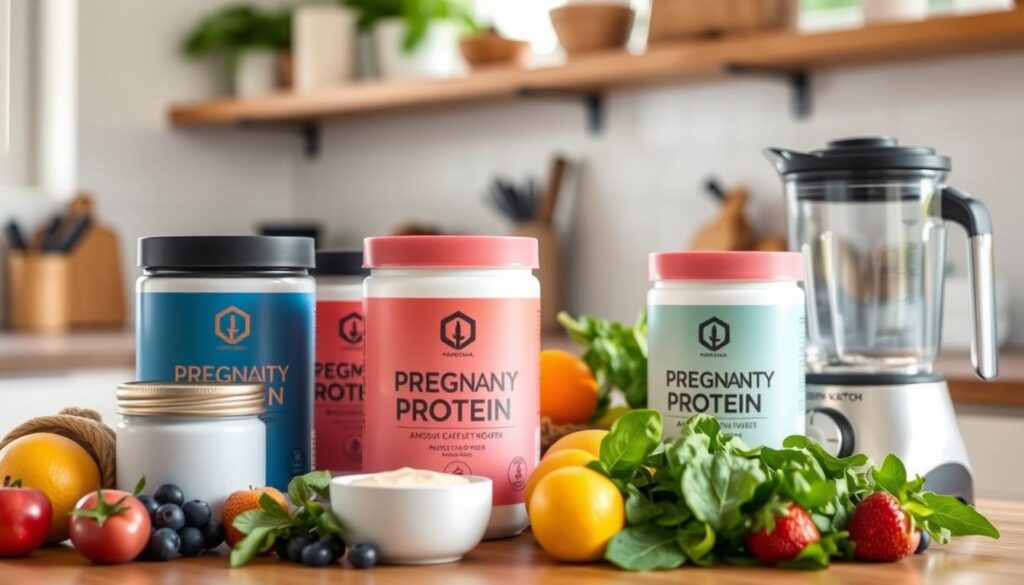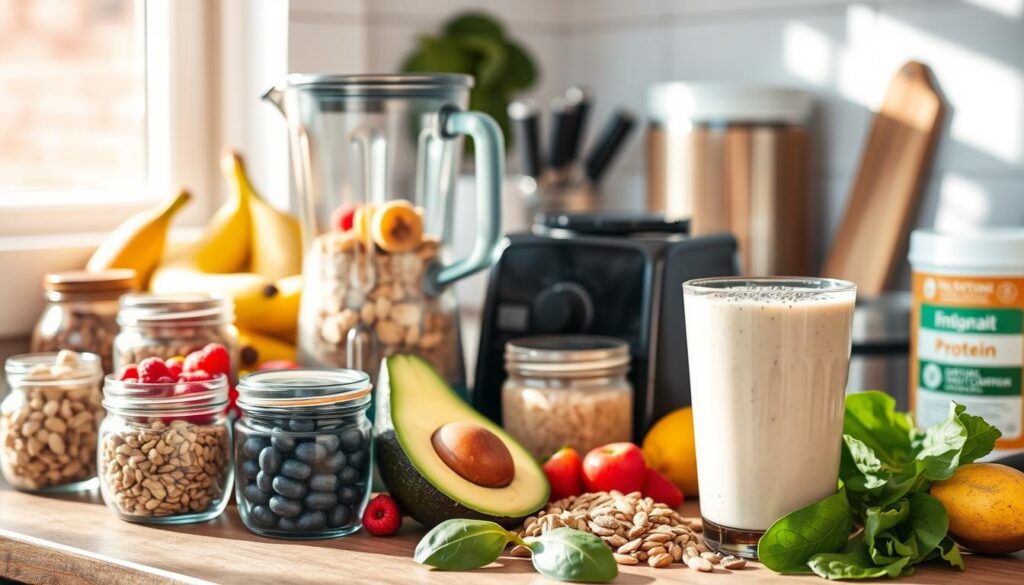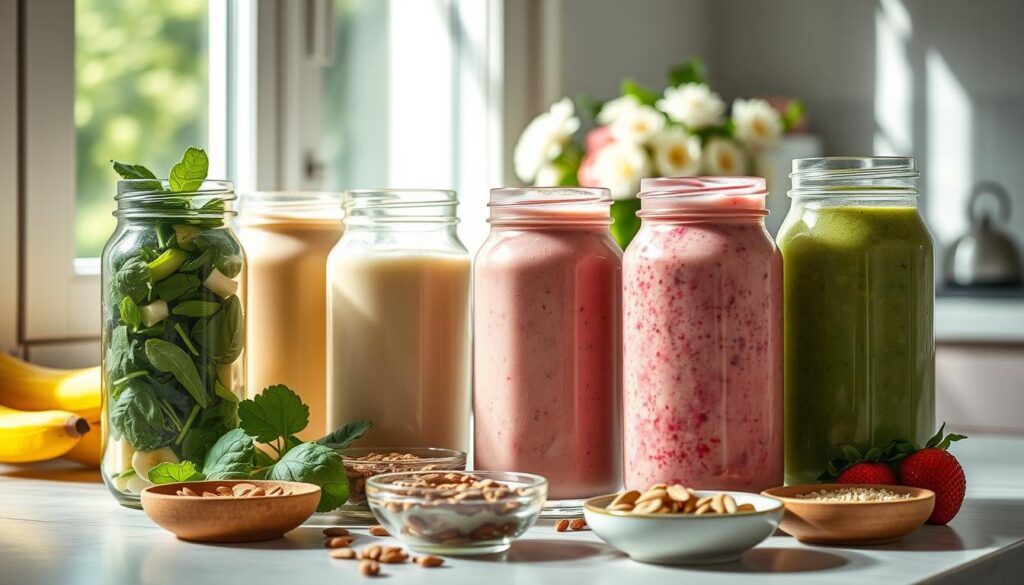Are protein shakes safe during pregnancy? Expectant mothers often look for easy ways to get more protein. It’s key to pick the right ingredients and talk to your doctor to make sure they’re good for you.
Protein is vital for the baby’s growth. Pregnant women need more protein than usual. They should aim for 60 to 100 grams a day, depending on their weight and activity level.
Some women might find it hard to get enough protein, especially if they’re feeling sick or don’t like certain foods. Protein shakes can help, but make sure they’re safe and healthy.
Look for protein powders that are free from bad stuff like artificial sweeteners and heavy metals. Forbes Health suggests talking to your doctor before adding protein shakes to your diet.
When making your shakes, use different types of protein like whey or soy. Add fruits, veggies, and healthy fats for extra nutrition. Remember, shakes should not be the only thing you eat.
Key Takeaways
- Protein shakes can be a convenient way to meet increased protein needs during pregnancy
- Choose high-quality, pregnancy-safe protein powders without harmful additives
- Consult with your healthcare provider before adding protein shakes to your diet
- Incorporate a variety of healthy protein sources and nutrient-dense ingredients
- Protein shakes should supplement, not replace, a balanced pregnancy diet
Table of Contents
Why Protein is Essential During Pregnancy
During pregnancy, a woman’s body changes a lot to help her baby grow. Protein is key for a healthy pregnancy. It helps build and fix tissues, makes hormones and enzymes, and boosts the immune system. As the baby grows, the mother needs more protein for herself and her baby.
The Role of Protein in Fetal Development
Protein is vital for fetal development. It gives the baby the building blocks for tissues, organs, and muscles. In the second and third trimesters, the baby grows fast, making protein intake crucial for the mother.
“Reviewers estimated fetal protein requirements to be around 440g over the course of pregnancy and an additional 100g for the placental protein requirement.”
The total protein increase during pregnancy is about 925g. This is for a 40-week gestation and a 3,300g newborn. It shows how important protein is for the baby’s growth and development.
Increased Protein Requirements for Expectant Mothers
Pregnant women need more protein for their health and the baby’s growth. Protein is needed for the growth of maternal tissues like the uterus and breasts. It also helps control blood sugar, reducing the risk of diabetes and hunger.
The recommended protein intake for pregnant women is 70 to 100 grams daily. This can be achieved with a diet rich in protein from foods like lean meats, fish, eggs, dairy, legumes, nuts, and seeds.
- Lean meats (e.g., skinless chicken breast, which offers around 26 grams of protein per serving)
- Fish
- Eggs (a hard-boiled egg contains about 6 grams of protein)
- Dairy products
- Legumes (lentils, a plant-based protein source, pack about 9 grams of protein per half cup)
- Nuts and seeds
| Protein Source | Protein Content |
|---|---|
| Skinless Chicken Breast (4 oz) | 26 grams |
| Hard-Boiled Egg | 6 grams |
| Lentils (1/2 cup) | 9 grams |
| Red Meat (4 oz) | 24 grams |
Protein supplements, like protein powders, can also boost protein intake. But, choose high-quality, safe options for pregnancy. Always check with a healthcare provider before adding any supplements to your diet.
Understanding Protein Needs During Each Trimester
As your pregnancy advances, your body needs more protein to support your baby’s growth. It’s important to get enough protein at each stage. We’ll look at what you need during each trimester.
Studies show pregnant women need 46 g/day of protein in the first trimester. In the second and third, it goes up to 71 g/day. This extra protein helps your baby and you grow. Eating foods high in protein, like those in healthy breakfast meal ideas, can help you reach your goals.
First Trimester Protein Requirements
In the first trimester, your protein needs don’t jump up much. But, it’s key to start eating well and include protein in your diet. This supports your body and your baby’s early growth.
Second Trimester Protein Demands
When you’re in the second trimester, your baby grows faster, and so does your protein need. This extra protein is vital for your baby’s growth and your own health. Eating foods like lean meats, fish, eggs, and nuts can help meet these needs.
“Adequate protein intake during pregnancy is crucial for the growth of fetal tissue and maternal tissue.” – Dr. Emily Johnson, Nutritionist
Third Trimester Protein Intake
In the third trimester, you need even more protein, about 70-100 grams a day. This supports your baby’s final growth and birth weight. To get enough, add foods like lean meats, fish, eggs, and nuts to your diet.
- Lean meats (chicken, turkey, beef)
- Fish (salmon, cod, tuna)
- Eggs
- Dairy products (milk, yogurt, cheese)
- Legumes (beans, lentils, peas)
- Nuts and seeds
Knowing your protein needs and making smart food choices is key. This ensures you and your baby get the nutrients you need. Always talk to your healthcare provider about your protein intake during pregnancy.
Choosing the Best Protein Sources for Pregnancy
Choosing the right protein sources is key for your baby’s growth. A diet rich in high-quality protein from animals and plants is best. Nutrition experts say up to 67% of pregnant people might not get enough protein. So, it’s vital to add protein-rich foods to your meals and snacks.
Animal-Based Protein Options
Lean meats, poultry, fish, eggs, and dairy are great for animal-based protein. They offer protein and important nutrients like iron, zinc, and vitamin B12. Here are some top choices for pregnancy:
- Lean beef, pork, and lamb
- Chicken and turkey breast
- Fatty fish like salmon, sardines, and anchovies (rich in omega-3 fatty acids)
- Eggs (a versatile protein source)
- Greek yogurt and cottage cheese (high in protein and calcium)
Plant-Based Protein Alternatives
If you’re vegetarian or vegan, or just want more plant-based options, there are many good choices. Legumes, nuts, seeds, and whole grains are all great for protein. Here are some top picks:
- Beans and lentils (rich in fiber, iron, and folate)
- Tofu, tempeh, and edamame (soy-based proteins)
- Quinoa (a complete protein source)
- Nuts and nut butters (almonds, peanuts, cashews)
- Seeds (chia, hemp, pumpkin)
| Protein Source | Serving Size | Protein Content (g) |
|---|---|---|
| Chicken breast | 3 oz | 26 |
| Salmon | 3 oz | 22 |
| Lentils (cooked) | 1/2 cup | 9 |
| Almonds | 1 oz | 6 |
| Quinoa (cooked) | 1/2 cup | 4 |
By mixing animal and plant-based proteins, you get all the nutrients your baby needs. This supports their growth and development.
Top Pregnancy-Safe Protein Powders
Looking for the best protein powders for expectant mothers means focusing on safety and quality. Choose protein powders with few ingredients and natural sweeteners like stevia or monk fruit. Whey protein is often recommended because it has essential amino acids for the baby and the mother.

The Ritual Essential Protein, Pregnancy & Postpartum, is a top choice. It has 20g of protein and 250mg of choline for fetal growth. The Transparent Labs Organic Vegan Protein offers 24g of protein from plants. Legion Whey+ protein powder comes in many flavors and is safe for pregnancy.
When picking protein powders, think about taste, texture, smell, and value. Over forty protein powders were tested for these qualities. Price matters too, with Ritual Essential Protein at $2.67 per serving and Transparent Labs Organic Vegan Protein at $1.67 or $1.50 with subscription.
Other safe options include:
- Needed Collagen Protein Powder: It has 14 grams of protein from bovine collagen, supporting health and gut.
- Klean Athlete Klean Isolate: It has 20 grams of protein from whey protein isolate, without artificial additives.
- Care/of Plant Protein Chocolate: It has 18 grams of protein and 8 milligrams of iron, important for pregnant women.
Adding a safe protein powder can help meet protein needs, which increase during pregnancy. But remember, protein powders should not replace whole foods. Always talk to a healthcare professional before adding supplements to your routine.
Adequate protein intake during pregnancy is essential for supporting fetal growth, maintaining maternal health, and promoting postpartum recovery.
Choosing a high-quality, safe protein powder and eating well can meet protein needs. Knowing about prenatal nutrition and making smart choices is key for the health of both mother and child.
Crafting Nutritious Protein Shakes for Expectant Mothers
Making nutritious pregnancy protein shakes is a great way to meet the extra protein needs of expectant moms. By using a mix of balanced ingredients, you can get all the vitamins and minerals needed for a healthy pregnancy. Choose high-quality protein sources and nutrient-rich additions to benefit both mom and baby.
Key Ingredients for a Balanced Pregnancy Shake
When picking ingredients for your pregnancy shakes, go for protein sources with all amino acids. Good choices include:
- Whey protein powder
- Plant-based protein powders (pea, hemp, or brown rice)
- Greek yogurt
- Silken tofu
Add nutrient-dense ingredients to boost your shake’s vitamin and mineral content. Think about adding:
- Fresh or frozen fruits (berries, bananas, mangoes)
- Leafy greens (spinach, kale)
- Healthy fats (avocado, nut butter)
- Fortified milk or plant-based milk
Mixing these ingredients can help you make balanced shake recipes that support your health during pregnancy.
Incorporating Essential Vitamins and Minerals
Pregnancy shakes are a chance to add important vitamins and minerals for fetal growth. Focus on nutrients like:
| Nutrient | Benefits | Sources |
|---|---|---|
| Folate | Supports neural tube development | Spinach, avocado, fortified milk |
| Iron | Prevents anemia and supports fetal growth | Leafy greens, fortified cereals |
| Calcium | Promotes strong bones and teeth | Dairy products, fortified plant-based milk |
| Omega-3 fatty acids | Supports brain and eye development | Chia seeds, flax seeds, walnuts |
When making your shakes, avoid added sugars and artificial stuff. Use natural sweeteners like fruit or a bit of honey if you need to. Focus on whole foods and avoid processed additives to make healthy shakes for a good pregnancy.
Remember, while protein shakes can help, they shouldn’t replace a balanced diet with lots of whole foods. Always talk to your healthcare provider or a dietitian before changing your diet during pregnancy.
Safe Protein Shakes for Pregnancy: Nourishing Options
Protein shakes can be a tasty and easy way to get more protein during pregnancy. But, it’s important to pick safe protein powders and make healthy recipes. Here are two yummy and healthy protein shake recipes for pregnant women.

Creamy Banana Oat Protein Shake Recipe
This creamy banana oat protein shake is a great choice for pregnant women. To make it, blend together:
- 1 scoop of pregnancy-safe protein powder
- 1 ripe banana
- 1/2 cup rolled oats
- 1 cup unsweetened almond milk
- A pinch of cinnamon
This shake is full of protein, banana, and oats. It’s filling and packed with nutrients for your baby. Oats help with constipation, and bananas give you potassium, vitamin B6, and vitamin C.
Refreshing Berry Spinach Protein Smoothie Recipe
Try this berry spinach smoothie for a refreshing and healthy shake. In a blender, mix:
- 1 scoop of pregnancy-safe protein powder
- 1 cup mixed berries
- 1 handful of spinach
- 1 cup coconut water
- Ice, as desired
This smoothie is full of vitamins, minerals, and antioxidants. Berries and spinach are packed with nutrients. Coconut water keeps you hydrated. You can add chia seeds for more nutrition.
Feel free to try different ingredients in your nourishing pregnancy protein shake recipes. Just make sure to use safe protein powders and talk to your doctor. With a little creativity, you can enjoy tasty and healthy protein shakes during your pregnancy.
Remember, while protein shakes are convenient, eating a variety of whole foods is key. Include lean meats, fish, eggs, dairy, legumes, nuts, and seeds in your diet. This ensures you get all the vitamins and minerals you need.
Low-Carb Protein Shake Options for Gestational Diabetes
For pregnant women with gestational diabetes, keeping blood sugar stable is key. Low-carb pregnancy protein shakes are a good choice. They help meet protein needs without too many carbs. With gestational diabetes affecting 6% to 9% of pregnancies in the U.S., finding the right shakes is important.
Choosing Low-Glycemic Ingredients
When making a low-carb protein shake, pick ingredients that don’t raise blood sugar. Add leafy greens, low-sugar berries, and healthy fats like avocado or nut butter. These make a shake that’s good for you and doesn’t spike blood sugar.
Here are some good ingredients for a low-glycemic shake:
- Spinach or kale
- Raspberries, blackberries, or strawberries
- Chia seeds or flax seeds
- Unsweetened almond milk or coconut milk
- Avocado or almond butter
Sugar-Free Protein Powder Alternatives
Choose a protein powder without added sugars for your shakes. Many have sugars or artificial sweeteners that can raise blood sugar. Instead, pick powders sweetened with natural options like stevia or monk fruit. This keeps carbs and sugar low.
| Protein Bar Type | Overall Rating | Carbs (g) | Fiber (g) | Protein (g) |
|---|---|---|---|---|
| High protein, low aftertaste | 9/10 | 22 | 11 | 20 |
| Wafer cookie-like | 8/10 | 12 | 1 | 13 |
| RX Bars with oats and peanuts | 7/10 | 28 | 4 | 10 |
Some protein bars, like the high protein, low aftertaste bar and the wafer cookie-like bar, are good choices. They have a lot of protein but not too many carbs or sugars. Always talk to a healthcare provider or dietitian to make sure your shakes fit your gestational diabetes plan.
“Adequate protein intake during pregnancy is vital for supporting fetal growth and development as well as maternal health.”
By using low-carb pregnancy protein shakes with healthy ingredients and sugar-free protein powders, expectant mothers can get enough protein. This helps manage blood sugar levels well.
Protein Shake Precautions and Considerations
Protein shakes can be a good way to get more protein when you’re pregnant. But, it’s important to think about some things before you start using them. Talking to your doctor about using protein powder safely is key.
When picking a protein powder, look at what’s in it. Some might have things that aren’t safe for pregnant women, like certain herbs or caffeine. Choose a simple, high-quality protein powder without extra stuff.
Be careful of protein powders with lots of sugar or artificial sweeteners. They can lead to weight gain and other health problems during pregnancy. Too much sugar can cause diabetes and early birth.
“Pregnant women are suggested to consume between 75 and 100 grams of protein daily, according to the American Pregnancy Association.”
Think about how much protein you need. Active pregnant women might need more than those who are less active. Women carrying twins or more might need even more protein.
| Pregnancy Stage | Recommended Daily Protein Intake |
|---|---|
| First Trimester | 46 grams (0.8 g/kg body weight) |
| Second and Third Trimesters | 71 grams (1.1 g/kg body weight) |
If you have allergies, check the protein powder labels. Avoid things like dairy, soy, or gluten. Choose a protein powder that fits your diet.
Don’t forget about the shelf life of protein powders. They can go bad in 18 months. This can make you feel sick. Always check the expiration date and keep your protein powder fresh.
Remember, protein shakes are just a part of a healthy diet. Eating whole foods like meat, fish, eggs, and beans is also important. This way, you get all the nutrients you need.
Talking to your doctor or a dietitian before adding protein shakes to your diet is crucial. They can give you advice that’s right for you. This ensures you’re getting the protein you need safely and effectively.
Incorporating Protein Shakes into a Well-Rounded Pregnancy Diet
Protein shakes can be a handy way to get more protein during pregnancy. But, they should not replace a diet full of whole foods. A good pregnancy diet includes fruits, veggies, whole grains, lean proteins, and healthy fats. This ensures you and your baby get all the nutrients you need.
Protein shakes can help meet your daily protein needs, which are 70-100 grams. But, whole foods should be your main source of nutrients. Foods like chicken and lentils are great for getting protein. They are packed with nutrients for you and your baby.
Balancing Protein Shakes with Whole Food Nutrition
Use protein shakes as a quick fix when you need them. They can help if you’re having trouble getting enough protein from whole foods. For example, a protein shake like Essential Protein Daily Shake Pregnancy & Postpartum adds 20 grams of pea protein. This can help meet your increased nutrient needs during pregnancy.
| Whole Food Protein Sources | Protein Content per 100g |
|---|---|
| Chicken breast | 31 grams |
| Lentils | 9 grams |
| Greek yogurt | 17 grams |
| Almonds | 21 grams |
While protein shakes are useful, they shouldn’t be your only source of nutrition. Focus on eating whole foods. Always talk to your healthcare provider before adding new supplements or protein powders to your diet. This ensures they are safe for you and your baby.
Conclusion
Adding safe pregnancy protein shakes to your diet is a smart move. It helps meet the extra protein needs during pregnancy. This supports the growth and development of the fetus.
When making protein shakes, think about your protein needs. These needs change throughout pregnancy. Mixing animal and plant proteins ensures you get all the amino acids you need.
Adding calcium, fiber, and iron to your shakes is also key. This boosts your overall nutrition during pregnancy.
But, always talk to your healthcare provider before changing your diet. It’s important to eat a variety of foods, not just shakes. This way, you get all the nutrients your body and baby need.
By focusing on healthy pregnancy nutrition and choosing the right nourishing protein options for expectant mothers, you set a strong foundation. This gives your baby the best start in life.
FAQ
Are protein shakes safe during pregnancy?
Protein shakes can be safe during pregnancy if you pick the right ones. Look for ones without artificial sweeteners, heavy metals, or harmful additives. Always talk to your healthcare provider before adding any supplements, including protein shakes, to your diet.
How much protein do pregnant women need?
Pregnant women need about 70-100 grams of protein each day. You can get this from many foods and supplements. Your protein needs go up in the second and third trimesters to help your baby grow.
What are the best protein sources for pregnancy?
It’s best to mix animal and plant-based proteins for a full amino acid profile. Good animal sources include lean meats, poultry, fish, eggs, and dairy. Legumes, nuts, and seeds are great plant-based options.
How can I create a nutritious protein shake for pregnancy?
For a healthy protein shake, use quality protein powders like whey or plant-based options. Add fruits, leafy greens, avocado, and Greek yogurt or unsweetened plant-based milk. Include spinach, kale, berries, and fortified milk or yogurt for extra vitamins and minerals.
Are there any protein shake precautions for pregnant women?
Always check with your healthcare provider before adding protein shakes to your diet. Avoid shakes with added sugars, artificial sweeteners, or too many calories. Some protein powders may have ingredients not safe for pregnancy, like certain herbs or caffeine.
Can protein shakes replace a balanced pregnancy diet?
Protein shakes can help increase your protein intake, but they shouldn’t replace a balanced diet. Eat a variety of whole foods like fruits, vegetables, whole grains, lean proteins, and healthy fats. Use protein shakes as a supplement to a well-rounded diet, not the only source of protein or nutrition.

Hello, I am Olivia Stone, and I’m here to help you find balance in the chaos. As a wellness coach, I’ve spent years teaching busy professionals how to integrate mindfulness, stress management, and holistic health into their daily routines. Wellness doesn’t have to be complicated—it’s about small, intentional actions that bring peace and positivity into your life. Let’s work together to create a lifestyle that not only supports your goals but inspires you to feel great inside and out.

